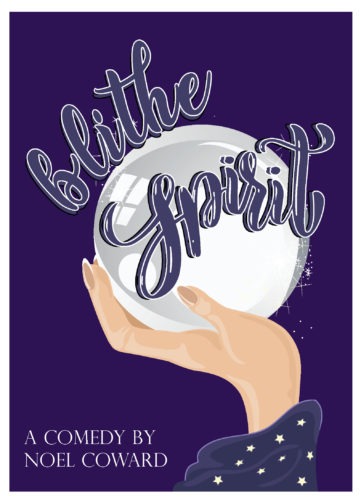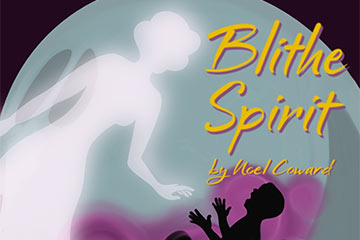Introduction
Blithe Spirit Summary And Themes By Noël Coward Noël Coward’s Blithe Spirit is one of the most beloved comedies in the English-speaking world, celebrated for its sharp wit, fast-paced dialogue, and deft handling of themes surrounding life, death, and the supernatural. Premiering in London in 1941, Blithe Spirit is a sophisticated, farcical play that delves into the intricacies of love, the unpredictability of human emotions, and the consequences of one’s past actions. As a playwright, Coward was known for his mastery of comedy, and Blithe Spirit is an exemplary display of his ability to blend light-hearted humor with deeper, more existential questions.
The play tells the story of Charles Condomine, a successful novelist, who invites a medium, Madame Arcati, to conduct a séance at his home as part of his research for a new book. During the séance, things go awry when the spirit of Charles’s first wife, Elvira, unexpectedly returns from the dead. What follows is a chaotic series of interactions between the living and the dead, with Charles caught in the middle, trying to manage his relationships with both his current wife, Ruth, and his deceased ex-wife, Elvira.
Coward examines the intricacies of relationships in Blithe Spirit, especially those involving memory, love, and jealousy. Elvira’s return as a ghost, the play’s supernatural element, serves as a potent metaphor for the protagonists’ unresolved feelings and the fallout from their previous deeds. The play poses important queries concerning the nature of marriage and love, as well as the limits of life and death, despite its humorous tone.
Summary of Blithe Spirit by Noël Coward
Blithe Spirit opens in the home of Charles Condomine, a successful writer of detective novels, and his second wife, Ruth. Charles is planning to write a novel that involves a séance, so he decides to invite the eccentric medium Madame Arcati to his house for a private séance. He is looking for material for his book and doesn’t take the séance seriously, hoping that Madame Arcati’s performance will provide a bit of comic material. Ruth, his wife, is skeptical and disapproving of the idea, but she reluctantly agrees.
During the séance, Madame Arcati, despite being somewhat comical in her eccentricity, manages to conjure the spirit of Charles’s first wife, Elvira, who died several years earlier. To everyone’s surprise, Elvira’s spirit materializes in the room, and she begins to interact with Charles. However, only Charles can see her—Ruth cannot see or hear Elvira, which creates a situation of growing tension and confusion.
Elvira, who is mischievous and somewhat vain, immediately begins to disrupt Charles’s life. She makes it clear that she has not forgiven him for remarrying Ruth and feels possessive of him, despite her death. Ruth, who does not understand what is happening, grows increasingly agitated by Charles’s odd behavior and his apparent obsession with an invisible person. The tension between Ruth and Elvira escalates, as Ruth believes Charles is becoming unstable, while Charles struggles to reconcile his love for both women, one living and one dead.
Read more
Throughout the play, the interactions between the living and the dead become more absurd and comical. Charles tries to hide Elvira’s presence from Ruth, but his attempts only make things worse, as Ruth becomes more suspicious of his actions. The situation intensifies when Ruth, in a fit of jealousy and frustration, demands that Madame Arcati try to get rid of Elvira’s spirit. Unfortunately, Madame Arcati, despite her best efforts, is unable to banish Elvira, and the spirit remains in the house.
At the climax of the play, Ruth, in a moment of anger, inadvertently causes her own death by being struck by a falling object. She then becomes a ghost herself, leading to a surreal and chaotic situation where Charles is now haunted by two wives—one living and one dead. The final moments of the play see Charles struggling to maintain some semblance of normalcy as the two women—one alive in spirit and one dead in flesh—continue to complicate his life. In the end, Charles’s life remains in turmoil, surrounded by the spirits of his two wives, leaving the audience to reflect on the complexities of love, death, and the lingering impact of the past.

Themes in Blithe Spirit by Noël Coward
1 Life, Death, and the Supernatural One of the central themes of Blithe Spirit is the relationship between life and death, and the way the supernatural forces enter the realm of the living. The return of Elvira’s ghost challenges traditional notions of death, suggesting that the line between life and death is not always clear-cut. The play treats the supernatural with humor, using Elvira’s ghostly presence as a comedic device, but it also raises important philosophical questions about the nature of the afterlife and the lingering influence of the dead on the living.
The play suggests that unresolved feelings between loved ones do not go away with death and that death is not the end. Rather, they might still haunt the living, frequently in strange and disorderly ways. Even after she passes away, Elvira’s relationship with Charles is still impacted by her unresolved feelings, especially jealousy. Her spirit is not one of serenity. Ruth’s own ultimate death adds complexity to this issue by highlighting the cyclical nature of life and death as well as the challenge of letting go of previous commitments.
2 Love and Jealousy Blithe Spirit explores the complexities of love, particularly in the context of marriage. Charles’s relationship with Ruth is marked by affection but also by unresolved tensions and misunderstandings. Ruth’s inability to see Elvira’s ghost, coupled with her growing suspicion of Charles’s odd behavior, leads to feelings of jealousy and frustration. Charles, meanwhile, is torn between his love for Ruth, his second wife, and his unresolved feelings for Elvira, his first wife.
The theme of jealousy plays a central role in the dynamics between the characters. Elvira’s ghost is not content to simply haunt Charles; she actively interferes with his relationship with Ruth, driven by jealousy over his remarriage. Ruth’s jealousy, too, is amplified when she learns of Elvira’s return, despite the fact that Elvira is no longer physically alive. The theme of jealousy highlights the ways in which love is often complicated by past relationships and emotional baggage, even after death.
3 Marriage and the Complicated Nature of Relationships Marriage is another key theme in Blithe Spirit, and the play examines the nature of relationships from multiple angles. Charles’s marriages to Ruth and Elvira are both complicated and dysfunctional, though in different ways. His first marriage to Elvira was marked by a deep connection but ultimately ended in death, and his second marriage to Ruth seems more stable, but is still marred by misunderstandings and lack of communication. The ghostly return of Elvira challenges the boundaries of these relationships and creates a chaotic environment where Charles is forced to navigate the emotional complexities of both women, despite their vastly different personalities.
Blithe Spirit suggests that marriage is not just a social contract but a complex emotional bond that is influenced by the past. Charles’s inability to fully escape his first marriage, even after Elvira’s death, points to the way that past relationships often continue to shape and haunt future ones. The play humorously critiques the institution of marriage by showing how easily it can be disrupted by unresolved emotional issues and external forces—such as the supernatural.
Read more
4 The Absurdity of Life Noël Coward is known for his sharp wit and satire, and Blithe Spirit is no exception in its treatment of life’s absurdities. The play’s comedic tone allows Coward to explore the chaos and unpredictability of life, particularly through the absurd premise of a ghost returning to haunt her ex-husband. The characters’ reactions to the supernatural events are often exaggerated and humorous, turning what could be a tragedy into a farce.
The absurdity of life is also seen in the characters’ attempts to rationalize and control the uncontrollable. Charles tries to maintain control of his situation by denying the reality of Elvira’s ghost, while Ruth’s attempts to confront and solve the problem only lead to further complications. The play suggests that life is often messy and unpredictable, and attempts to impose order on it may lead to chaos rather than resolution.
5 The Role of the Medium Madame Arcati, the eccentric medium who inadvertently brings Elvira’s ghost back to life, is another important symbol in the play. As a medium, Madame Arcati occupies a space between the living and the dead, and her role in the play highlights the theme of the supernatural’s influence on human affairs. Arcati’s character is portrayed with a mixture of humor and seriousness, and while she is often seen as a comic figure, her actions have serious consequences for the characters.
The concept of the unknown is further emphasized by the role of the media. The drama implies that the supernatural is erratic and uncontrollable, much like human emotions, and that Madame Arcati, despite her best efforts, is powerless to influence or forecast the séance’s conclusion. In addition to providing comedic relief, Madame Arcati serves as a reminder of the more powerful, uncontrollable influences that influence the protagonists’ lives.

Analysis of Form and Style
In Blithe Spirit, Noël Coward’s writing style is distinguished by witty banter, quick-paced dialogue, and an air of elegance. The play is set up like a farce, with quick-fire conversations and a string of miscommunications that propel the story along. Because the characters are continuously attempting to make sense of a more nonsensical situation, this fosters a sense of urgency and absurdity.
The play’s use of supernatural elements—particularly the return of Elvira’s ghost—adds an element of the fantastic to the narrative, but Coward handles it with his characteristic sense of humor. The blend of the supernatural with the mundane creates a tension that keeps the audience engaged, as the characters react to the impossible in ways that are both humorous and relatable.
The setting of the play, primarily taking place in Charles’s home, is another important aspect of its structure. The confined space creates a sense of claustrophobia, as Charles and the other characters are trapped in the chaotic situation of having two wives—one living and one dead—under one roof. This setting enhances the farcical nature of the play, as characters’ attempts to escape or resolve the situation only lead to further complications.
FAQ
1 What is Blithe Spirit about?
Blithe Spirit is a comedy about a man, Charles Condomine, whose first wife, Elvira, returns as a ghost during a séance. The play explores themes of love, jealousy, marriage, and the supernatural, as Charles finds himself caught between his two wives, one living and one dead.
2 Who is Madame Arcati?
Madame Arcati is a medium who accidentally conjures the ghost of Elvira during a séance. She is eccentric, somewhat comical, and unaware of the full impact of her actions. Her character adds a humorous element to the play, as she tries to solve the situation she inadvertently created.
3 Why does Elvira return as a ghost?
Elvira returns as a ghost because she is upset that Charles has remarried. She is unable to move on from her attachment to him, and her jealousy and unresolved feelings lead her to haunt him after her death.
4 How does Ruth react to Elvira’s ghost?
Ruth cannot see or hear Elvira’s ghost, which creates tension between her and Charles. She grows increasingly suspicious of Charles’s behavior and believes he is becoming mentally unstable.
5 What is the significance of the play’s title?
The title Blithe Spirit refers to the carefree and mischievous nature of Elvira’s ghost. It captures the light-hearted yet unsettling atmosphere of the play, where the supernatural and the absurd collide.
Read more
















